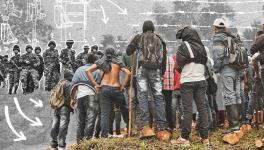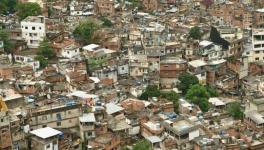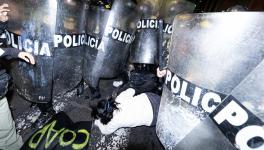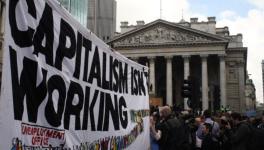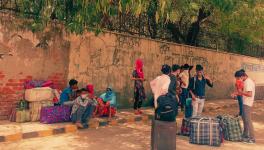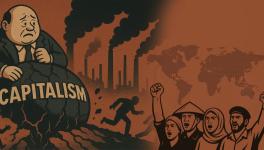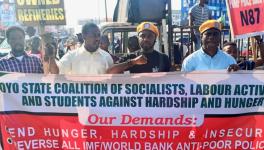One Year After Taking Charge, Nayib Bukele Faces Severe Criticism for Handling of COVID-19
Salvadoran President Nayib Bukele
Nayib Bukele has been one of central America’s most talked about politicians. He became the president of El Salvador on June 1, 2019 during a time of convulsion in the region, amid a rising number of migrants heading to the US border in caravans and continuing violence. Bukele promised change and a new El Salvador. The party he founded after being expelled from the left-wing Farabundo Martí National Liberation Front (FMLN), is called New Ideas. Bukele was able to tap into his youth and his use of social media too to connect with his base.
However, throughout his one year in government, social movements and left organizations in the country have denounced the Bukele administration as authoritarian, seeing an increase of militarization and increased tensions between the branches of power.
Pandemic and dizzying political conflicts
The conflicts between the branches of government in El Salvador have been at the center of criticisms of Bukele’s mishandling of the COVID-19 pandemic. Since May 15, the executive branch has been embroiled in a political dispute with the legislative assembly over the legal jurisdiction over the quarantine measures in the country.
The conflict arose after the expiry of the state emergency decree on May 15 and its subsequent extension by the president. The extension of the state of the emergency, and the strict quarantine measures, was rejected by the Legislative Assembly. Instead the assembly strengthened its own law which expired on May 24.
The opposition party’s rejection of the state of the emergency decree has been painted by Bukele as a move against the measure of quarantine, and thus a risk to the people. Bukele has held many press conferences and taken to social media to denounce the Legislative Assembly as well as the Supreme Court and decry their attempt to come up with a new law.
Talking to Peoples Dispatch, Raúl Palencia, a militant from El Salvador, pointed out that this narrative left out the fact that the assembly’s “quarantine law maintained the home quarantine, the restrictions on movement, etc.”
Palencia explained that furthermore, Bukele’s state of emergency decree gave him certain exceptions such as “the executive’s ability to execute a budget at his discretion to empower security forces to generate tensions, use lethal force to persecute those who violate lockdown measures, or quarantine in containment centers.”
While Bukele’s firm response to the pandemic was initially applauded as his discourse seemed to put people at the center, organizations have denounced that it permitted a series of human rights violations. This included the arrest and detention of thousands in crowded centers for ‘violating quarantine,’ a move that inevitably puts them more at risk of infection.
Another reason for Bukele’s vehement opposition could be the fact that the bill proposed by the Legislative Assembly seeks to ensure that any budget proposed by the executive has to approved by the assembly to ensure full transparency.
The Assembly’s bill is on health. Palencia said, seeks to empower “not the executive but the health ministry to present both a budget and a strategic plan to deal with the rest of the crisis and also to gradually reopen the economic activities.”
In addition, the law took in to account the repatriation of people stranded outside El Salvador, the care and monitoring of the human rights of people in the quarantine centers, as well as the promotion of the decentralization of health and monitoring of different hospitals that have been earmarked to deal with COVID-19 positive cases.
Palencia added that the law dealt with “much broader aspects and was also agreed upon between different political forces. When the law was made public, Nayib, on his Twitter account, said that he would veto the law and that he would even do it in a delayed manner, taking as much time as he needs to be able to read and review it.”
Due to the deadlock between the legislative branch and executive branch and the subsequent confusion, on May 22, the Supreme Court ordered the two branches to hold a dialogue. There they were to arrive at a consensus on the quarantine, time-frames to reopen the economy, restrictions on mobility, authorization for public purchases and a freeze on the law of access to public information. The court prolonged both branches’ legislation with regards to the quarantine till May 29, but declared that by then, an agreement had to be reached.
On May 30, after a week of intense dialogue and debate, no consensus was reached and the president and his representatives withdrew from dialogues and vowed to veto the law agreed upon by the Assembly. Later that day, the Assembly voted and passed the “Special Transitory Law of Comprehensive Attention to Life and Health, Declaration of State of Emergency with relation to the COVID-19 Pandemic and Economic Re-opening,” and Bukele immediately announced he would veto it.
Insufficient measures
The COVID-19 pandemic broke out in the Latin American and the Caribbean region in late February and early March. The majority of the countries have suffered decades of neoliberalism and imperialist domination. They have therefore limited public sector budgets to support citizens, debilitated healthcare systems, and less access to vital medical equipment.
Many governments quickly imposed strict quarantine measures and closed borders. Bukele did the same between March 18 and 21, even before there were registered cases of COVID-19 in the country. The quarantine measure were accompanied by the announcement of measures such as payment of 300 USD for the poor and vulnerable families and a focus on informing the people on the management of the pandemic and the crisis.
However, as these measures were rolled out, people began to see their serious shortcomings. Palencia said that many problems arose in the distribution of economic aid, “Citizens reached the distribution centers called “henares” at 5 a.m. These centers are directly being run by the State, without involving the mayors and the local governments. When the officials arrived, they saw a multitude of unorganized people. People were not properly lined up. The majority was not registered, because people didn’t know that they had to do so via the internet before coming to the centers. This led to a disorderly situation and the crowd became unmanageable. The centers were shut and people came back home empty-handed.”
The disorganization and failure to distribute aid to all those who needed it further increased the desperation among the working class and the poor who are already disproportionately suffering under the lockdown, because they cannot go out to work and earn their livelihoods.
Palencia also harshly criticized Bukele’s weaponization of guilt and fear as a way to control the population. “He does this to empower the entire security system and all the state repressive apparatuses, such as the police and the armed forces, so that they can question people, arrest them and take them to the containment centers if they are violating quarantine.”
This detention of people supposedly violating the quarantine was widely criticized for the irregularities, injustices, and human rights violations. As more people were detained, the containment centers began to fill and those people were put at even more risk. Palencia said that, “We saw that they were not being taken care of properly and were not being fed. Some of them have been inside since the beginning of quarantine, for about 60 days, without receiving any response.”
People’s resistance
However, along with the opposition to Bukele’s measures waged by the parliamentary opposition, the Salvadoran people have also began to rise up against the state. They are specifically criticizing the abandonment of the vulnerable populations, the growing hunger and poverty, the lack of a strategic plan, the lack of an economic recovery plan and the lack of a concrete healthcare plan.
Many families began to place white flags outside their homes to identify themselves as hungry, to draw the attention of authorities and to raise awareness to the conditions and needs of the people. People have also organized mobilizations such as cacerolazos, banging pots and pans, noise rallies with people blowing their car horns and setting off fireworks, as well as campaigns on social media.
“It is important to see how all this has been led by a very broad section of the society, which is unhappy with the measures taken by the government,” Palencia said, “A few weeks ago, a report issued by the CID Gallup, a right-wing Central American pollster, revealed that about 97% of the people were in favor of Nayib Bukele’s management and only 3% were unsatisfied. These protests have also been an identifier of the different sectors that disapprove the government. This alleged 3% is heard at 8pm every day in El Salvador with fireworks, pots and pans, horns and all other kinds of noise. And every day more and more sectors, neighborhoods, colonies, zones and communities have been joining them.”
With regards to the opposition to his government, Bukele has also fought a battle to discredit protesters as rich kids unsatisfied with the economy who want the government to collaborate with the private sector. However, Palencia stated, “Over the last few weeks, this version has turned out to be a lie and it is clear that there are many more sectors, which are demonstrating to express their dissatisfaction with the government.”
Get the latest reports & analysis with people's perspective on Protests, movements & deep analytical videos, discussions of the current affairs in your Telegram app. Subscribe to NewsClick's Telegram channel & get Real-Time updates on stories, as they get published on our website.









